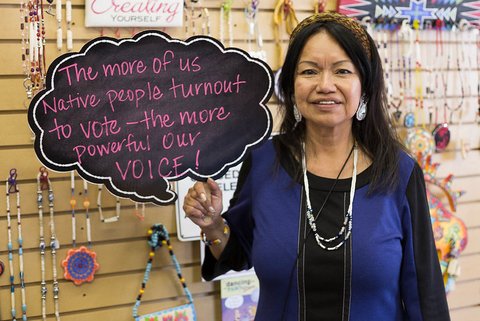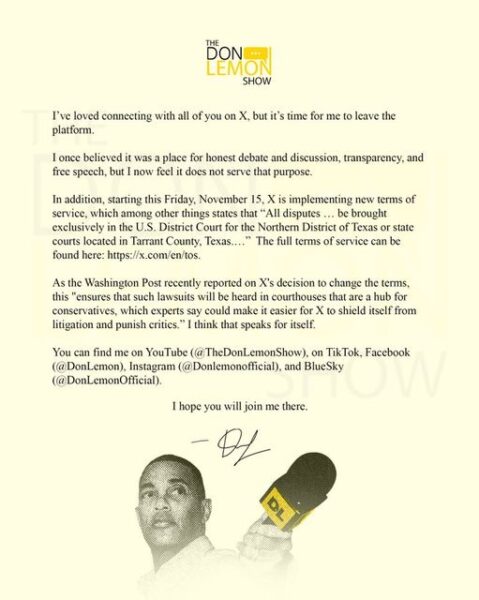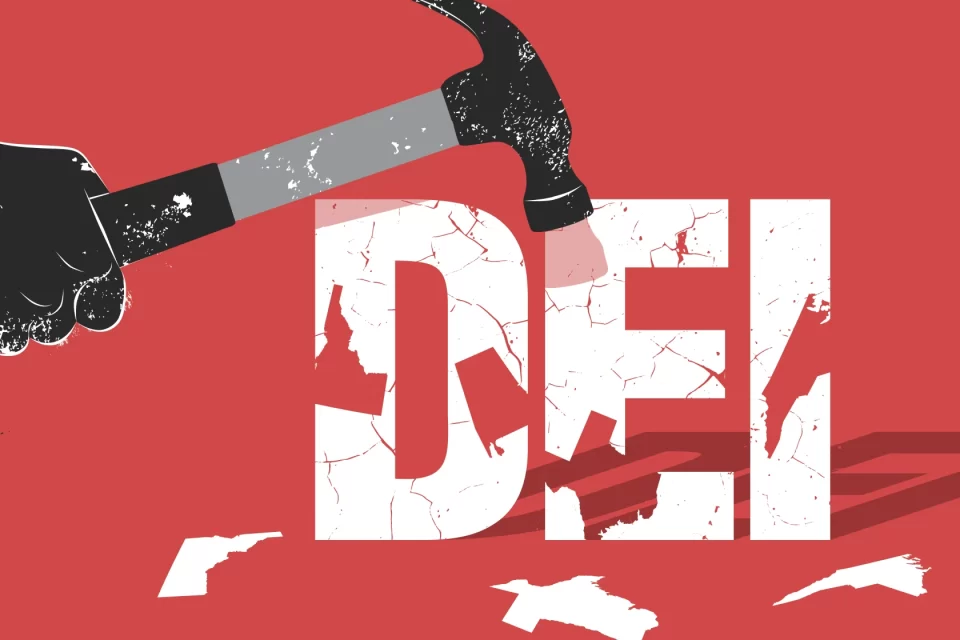Meaning of ‘News Business’ Should Be Broadened
Why Predictions of a ‘Neck and Neck’ Race Were Wrong
Indigenous Journalists Slam Pro-Trump Exit Poll
Don Lemon Says He’s Leaving Musk’s X
L.A. Times Publisher to Create New Editorial Board
Elaine Effort, Pittsburgh Trailblazer, Dies at 74
Homepage illustration: Chronicle of Higher Education
More to come
[btnsx id=”5768″]
Donations are tax-deductible.
People of Mexican descent, including U.S.-born citizens, were put on trains and buses and deported to Mexico during the Great Depression. In Los Angeles, up to 75,000 were deported by train in one year. In the just-ended presidential campaign, the news media paid scant attention to this forerunner of Donald Trump’s pledge of mass deportations. California Gov. Gavin Newsom signed a bill in September that will enable a selected nonprofit to construct and maintain a memorial to the forced “repatriation” in a public area of Los Angeles. (Credit: Los Angeles Times)
Meaning of ‘News Business’ Should Be Broadened
The decades-long quest for diversity in the news business just got harder.
But despite the election of Donald J. Trump and a Republican Congress, a redoubling of efforts coupled with a broadening of what’s considered the news business might produce progress.
First, what diversity advocates are up against. “With a Republican Senate, Trump will be able to appoint several new Supreme Court justices, who will be young enough to give Republicans control of the Supreme Court for the next 20-25 years,” wrote commentator Keith Boykin last week for Word In Black, the consortium of Black newspapers.
“That means if you wanted reparations, reproductive rights, LGBTQ rights, DEI, environmental protections, or any progressive policy, that won’t happen in your lifetime, no matter who succeeds Trump in office because the courts will strike it down.”
Added Julian Mark Monday in The Washington Post, “Minority- and women-owned businesses are bracing for the end of affirmative action in federal contracting — and the potential loss of contracts worth at least $70 billion a year — as government programs for ‘disadvantaged’ firms have fallen to legal attack over the past year.
“California, the first state to pass a prohibition, is often held up as an example of what lies ahead if the federal government drops its core race-conscious programs. The passage of Proposition 209 in 1996 ended the use of racial and gender considerations in government, including the awarding of state and local contracts.
At the October board meeting of the National Association of Black Journalists, Rodney Brooks, finance chair, continued to warn the board that the forces against diversity, equity and inclusion programs continue to make gains that would escalate should the Republicans win the presidency. However, the withdrawal of some corporate DEI programs has not yet affected NABJ, he said.
The journalists-of-color associations have yet to act jointly about the threat, and the News Leaders Association, which conducted an annual news-outlet-by-news-outlet diversity survey, dissolved over the summer.
However, the News Media Alliance, the trade association for 2,200 newspaper and magazine publishers, might take up the issue. “You raise a very important question regarding how the election outcome may impact diversity in the industry, and it is something that we will be considering as we work internally to plan for next year, the Trump administration and the Republican-led Congress,” Charlotte McBirney, senior counsel and director of public policy, messaged Journal-isms Wednesday.
In the schools, “If President-elect Trump keeps his campaign promise to eliminate the U.S. Department of Education, federal protections for Black collegians and their peers who make campuses diverse (including Jewish and Muslim students) will be weakened,” Shaun Harper wrote Tuesday for Inside Higher Ed.
“If the defunding and discontinuation of DEI programs, policies and professional roles accelerates as expected over the next four years, interracial conflicts between groups and violent attacks on students of color will probably occur. It also is possible that the bomb threats that HBCUs [historically Black colleges and universities] experienced a few years ago will happen again if no one in the White House or the federal government has plans to pre-emptively thwart them.
Local authorities raided the Marion County Record, a Kansas weekly newspaper, and the homes of a councilwoman and Eric Meyer, the newspaper’s publisher, last year in a case that sparked outrage and a nationwide debate over First Amendment rights. A former reporter reached a $235,000 settlement as part of a lawsuit she filed over the search. President-elect Donald Trump has repeatedly issued specific threats to weaponize the U.S. government against the media when he is displeased with their coverage. (Credit: YouTube)
Not a conducive atmosphere for students in the journalism pipeline.
Nor does it help that in the post-election finger-pointing, Democrats are being slammed for practicing “identity politics,” a phrase that even includes supporting diversity statements for job applicants.
All this is happening as the election results demonstrate a need for better reporting, which requires more, not less diversity.
Many were surprised that Latino men broke for Trump, or that white women without college degrees did, too, despite hopes that the fight for reproductive rights would unite the sisterhood. Much attention was spent on perceived defections to the Republicans among Black men, though in the end, 77 percent of Black men voted for Vice President Kamala Harris, with Black women at 91 percent, according to exit polls.
The relative inattention paid to Latinos during the campaign irked Helen Ubiñas, a Philadelphia Inquirer columnist who joined Luis F. Carrasco and Sabrina Vourvoulias, two other Latino opinion writers at the Inquirer, in a post-election discussion of the outcome.
“If you want to have a conversation about more Latino men breaking for Trump, fair. If you want to have a conversation about the issues that made the Tangerine Tyrant attractive to our community, let’s do that,” Ubiñas said. “If you want to have a conversation about sexism and misogyny and racism within Latino communities, by all means. But then let’s go beyond stereotypes and also have a discussion about how many of these generalizations don’t seem to play out when Latin American countries vote for female presidents, something we can’t seem to do here in the good ol’ US of A because of one constant: white supremacy.”
That’s another diversity issue: Who sees white supremacy in action and who doesn’t.
It’s also undeniable that “the news business” itself needs redefinition.
That’s clear as day even in South Africa, where the Daily Maverick, commenting on the U.S. election, said in a fund-raising email, “Journalism was already on its knees before Trump entered the arena. Having suffered disruption blows from the right hook of the digital age and the uppercut of advertising flowing to big tech (and away from news media), the industry found solace in a fundamentally flawed new business model: the paywall.
“For the news junkies among you, you’ll understand the frustration of coming across an article that piques your interest, only to be denied access to it until you subscribe: that’s a paywall.
“Now, imagine you’re not really that interested in reading the news. What’s the likelihood that you’ll pay to read that article? . . .
“One of the most successful news publications in the world, The New York Times, boasts 11 million subscribers.
“There are an estimated 260 million adults in the US.
“On the other hand, social media is free. Elon Musk has, at the time of writing, 204.2 million followers.
“And so, the stage was set: from as far back as the 2016 election, Trump offered the world the notion of ‘fake news’. He promoted it, repeated it and made it stick.
“He then befriended the richest man on the planet, and owner of X, and orchestrated his campaign on a platform where there is no regulation or fact-checking. Through this campaign he told the world that news media was ‘propaganda’ In the full knowledge that the public could not, and would not, pay to read the facts hidden behind the paywalls.”
We know the result.
The Chronicle of Higher Education, which tracks anti-DEI efforts affecting colleges and universities, explains the meaning of “DEI.” (Credit: YouTube)
In a report last week from the Civic Health and Institutions Project, a 50 States Survey by a multi-university group of researchers, the group listed this as its top takeaway:
“Friends and family (29%) and news media (26%) are the top sources Americans use for voting information, with younger people (18-24) leaning more on personal networks, and the older population (65+) favoring news media. . . . Three quarters of Americans identify sources other than the news media as their main way of staying informed about the 2024 election.”
Added Tom LoBianco, politics reporter for 24sight News, “This was the first election where cellphones, Big Tech platforms (from YouTube to TikTok and all points in between) evolved into the dominant force, sidelining the former mainstream media. And the new Mainstream Media, distinctly conservative and populist, emerged.”
The answer seems obvious: The challenge for diversity advocates is to further penetrate the media that attract “family and friends.”
Stephen J. Adler, director of the Ethics and Journalism Initiative at the NYU Arthur L. Carter Journalism Institute, wrote Tuesday for Columbia Journalism Review, “Local, independent, and niche media, spread throughout the country, can offer a revealing window on their communities and, sometimes, even on national issues and the national mood.
“They have done amazing work this past year. We wouldn’t know about astonishing corruption and abuse by Mississippi sheriffs over two decades if not for the intrepid reporting of Mississippi Today, in collaboration with the New York Times. We wouldn’t know about poor healthcare and neglect in Maine’s residential care facilities, and the state’s ineffectiveness in reining in these abuses, without the independent, nonprofit Maine Monitor, in partnership with ProPublica. It was the hyper-local North Shore Leader that broke the story of George Santos’s lies and corruption well before he was elected to Congress.
“And on and on. That kind of record makes supporting and funding such local nonprofits absolutely essential.
“In addition, national news organizations should rely more on local media for local coverage, establishing true partnerships in which the work of the local outlets is respected and embraced.”

Trina Reynolds-Tyler, left, and Sarah Conway interviewed dozens of people over two years for “Missing in Chicago,” a seven-part series awarded a Pulitzer Prize for local reporting, the result of a dogged investigation into missing Black women and girls. Reynolds-Tyler, data director at the Invisible Institute and Sarah Conway, a senior reporter with the nonprofit journalism lab, City Bureau, collaborated. (Credit: Cai Thomas)
Last month, the Pivot Fund, a project of philanthropic foundations, announced that 205 small local news outlets – including one in every U.S. state – will receive a share of $20 million to close persistent coverage gaps in their communities.
That’s a move in the right direction.
We can’t ignore the need for diversity at the national networks, wire services and newspapers. They have their roles as agenda-setters. They have the resources that friends and family don’t.
Same with the press organizations that have declared that they won’t be cowed by an anti-media Trump administration planning to work around them with its own communications networks. Their First Amendment responsibilities, they insist, demand no less.
That’s true even if you believe that “Americans’ rejection of soft liberalism at the polls was also a rebuke of the media forces that powered it,” as Sara Fischer wrote Tuesday for Axios.
“While Trump appeared regularly on Fox News in the run-up to the general election, his lack of investment in most traditional TV and print outlets didn’t hurt his campaign.
“The big picture: Up until this point, much of the MAGA media machine has thrived without corporate America’s blessing, relying on direct subscription dollars from mega-fans and direct response advertisers that sell lifestyle goods and services, such as coffee, gold, debt services and supplements.
“But a historic election shift right could push institutional investors and corporate advertisers to reconsider MAGA media’s reach.
“What to watch: If they don’t, Republicans — who will soon control the White House, Senate and, likely, the House of Representatives — will ramp up their pressure campaign.”
Who will be the counterweight?
Why Predictions of a ‘Neck and Neck’ Race Were Wrong
“President-elect Donald Trump made a stunning political comeback, largely outperforming how polls expected him to do for the third election in a row,” Kinsey Crowley reported Friday for USA Today.
“In the days leading up to Election Day, poll after poll showed him in a neck-and-neck race with Vice President Kamala Harris. State officials predicted the results could take days. Lawsuits from Trump-aligned groups were prepared to challenge the results. In the end, the race was called before most of the country woke up Wednesday. Trump won, and it was not particularly close.
“But this election’s results brought clarity to a growing theory about why polls have underestimated Trump’s performance, according to Pew Research Center’s vice president of methods and innovation Courtney Kennedy: Democrats participate in surveys more than Republicans. . . .”

“Warm Springs Native Vote” by Alyssa Macy for Confederated Tribes of Warm Springs, Oregon / Flickr / CC BY-NC-ND 2.0 license)
Indigenous Journalists Slam Pro-Trump Exit Poll
“In the wake of the election, an exit poll conducted by Edison Research showing that 65 percent of American Indians voted for Donald Trump, has been circulated by various news organizations, including NBC,” the Indigenous Journalists Association declared Wednesday.
“This poll is highly misleading and irresponsible — American Indians only represent 1 percent of the total voters surveyed, meaning that a few hundred self-identifying respondents are being used to represent the diverse interests of millions of Indigenous people across the country. None of the exit poll locations, for example, were on tribal land.
“The poll, which has already led to widespread misinformation on social media and is being used by right-wing commentators to tout Trump’s support among Indigenous voters, is another example of how ill-equipped many news outlets are to cover Indigenous communities.”
In an email to Journal-isms Wednesday, Edison Research conceded that the poll should not be taken as definitive, at least regarding the national results.
“Although the sample size of Native Americans met the National Election Pool minimum criteria for reporting sub-groups, you are correct that it is a small sample,” messaged Rob Farbman, executive vice president, Edison Research, referring to the indigenous journalists’ statement.
“The potential sampling error is +/- 9 points on the Native American subgroup. And as you note, there are additional areas for potential error when sampling Native Americans. Based on all of these factors, this data point from our survey should not be taken as a definitive word on the Native American vote.” However, he said the survey was correct on region and urban/rural/suburban figures.
The Indigenous Journalists statement continued:
“For years, the Indigenous Journalists Association has called for ethical coverage of Indigenous communities, and mainstream media has often missed the mark or failed. This incident highlights the importance of media that is able to accurately and responsibly cover Indigenous stories. Nuanced, ethical coverage can only truly happen if Indigenous media is respected and freedom of press rights are protected. The election of Trump, who has repeatedly targeted and threatened journalists, will have many implications for journalism. . . .”
Separately, Stephanie Fryberg, Ph.D., founding director, research for the Indigenous Social Action and Equity Center (RISE) at Northwestern University and professor of psychology there, provided more detail Friday about the objections in a piece for Native News Online.
“Our findings show that 60% of Natives identify as liberal, 33% identify as moderate, and 12% identify as conservative. Just over half of our sample identified as Democrat, 9% identified as Democratic Socialists, 26% identified as Independent, and 7% of the sample identified as Republican. . . .”
“The national media continues to lack accountability when analyzing and reporting on Native issues and misrepresents data that negatively impacts the visibility of Native people. . . .”
- Acee Agoyo, indianz.com: Republicans take U.S. Senate with promises of a Donald Trump agenda
- Mitchell Armentrout and Emmanuel Camarillo, Chicago Sun-Times: Trump makes gains among Chicago Latino voters unsatisfied with Democrats
- Mia Berry and Tasha Stewart, Andscape: Kamala Harris’ presidential election loss dampens mood at Howard, but pride remains
- Hayes Brown, MSNBC: Democrats would get nothing for throwing trans Americans under the bus
- Matt Brown, Fernanda Figueroa, Hannah Fingerhut and Linley Sanders, Associated Press: Young Black and Latino men say they chose Trump because of the economy and jobs. Here’s how and why
- Rachel Bunch, Essence: Howard’s Heartbeat: The Yard Brings Together Alumni, Students And Supporters For Kamala Harris
- Fernanda Camarena, Poynter Institute: The mainstream media misunderstood Latino voters once again
- Russell Contreras, Axios: Trump’s gains with Latinos echo anti-immigrant sentiment of the past
- Oliver Darcy, Status: David Remnick sounds off on the 2024 election, MAGA Media, Jeff Bezos, and more
- Pauly Denetclaw, ICT News: After the Election: Work continues for Indigenous nations
- Maureen Dowd, New York Times: Democrats and the Case of Mistaken Identity Politics
- Reid J. Epstein, Lisa Lerer and Nicholas Nehamas, New York Times: Devastated Democrats Play the Blame Game, and Stare at a Dark Future
- Sarah Fischer, Axios: MAGA media map
- Sara Fischer and Sophia Cai, Axios: Scoop: Trump expected to shake up White House briefing room
- “The Five,” Fox News: Judge Jeanine bashes idea of Harris replacing Biden in final hour, says ‘they want to make her president again without a vote
- Samuel G. Freedman, Columbia Journalism Review: Another Letter to a Young Journalist
- Gerren Keith Gaynor, theGrio: For Black Democrats, Kamala Harris’ defeat to Trump is personal
- Hadas Gold, CNN: ‘Death by a thousand cuts’: How experts warn Trump could use an authoritarian playbook to go after the media
- Renee Graham, Boston Globe: America f-ed around. Now, it’s about to find out.
- Cali Green, the Root: How Trump Went from Hip Hop’s Favorite Wealth Icon to the Culture’s Supervillain (June 25)
- Erica L. Green and Maya King, New York Times: For Black Women, ‘America Has Revealed to Us Her True Self’
- Emil Guillermo, Patreon: Emil Amok’s Takeout 783: The strange new electoral diversity
- Suzette Hackney, USA Today: Trump is a big reason Americans are fractured. We must rally around each other.
- Shaun Harper, Inside Higher Ed: Protecting Black Students During the Second Trump Presidency
- Tyche Hendricks, KQED, San Francisco: Over 1 Million Were Deported to Mexico Nearly 100 Years Ago. Most of Them Were US Citizens (Aug. 29)
- Josh Hersh, Columbia Journalism Review: How Trump Won the Latino Vote
- Nichi Hoskins, HuffPost Black Voices: A Black Woman’s Open Letter To Kamala Harris
- Human Rights Watch: Trump Presidency Poses Major Threat to Human Rights (video)
- Roy S. Johnson, al.om: He made America hate again, yet Trump’s victory shall not define us all
- Colbert I. King, Washington Post: Who are we? We are about to find out.
- John Koblin, New York Times: Viewers Flee MSNBC, and Flock to Fox News, in Wake of Election
- Reynaldo Leaños Jr., Nour Saudi, Ariel Goodman, Inés Rénique, Glorimar Marquez and Francis Poon, Latino USA: Trump Is Back, Now What?
- Noah A. McGee, the Root: Hip-Hop Has Historically Loved Trump, But Here’s How Rappers Are Responding to His Victory
- Ruben Navarette Jr., Creators Syndicate: Latinos sent a message to Democrats: Don’t take us for granted
- Macollvie J. Neel and Fritznel D. Octave, Haitian Times: Haitians react after Trump win, pondering what his second term might bring
- Malcolm Nance, Substack: My Family Died For The Republic We Have Just Lost
- Santul Nerkar, New York Times: How Media Outlets on the Right and Left Explained Trump’s Win
- Phillip Nieto, Mediaite: ‘Y’all Got To Have A Conversation’: MSNBC’s Symone Sanders Points Finger at White Women For Harris Losing to Trump
- B.A. Parker, Gene Demby, Christina Cala, Leah Donnella, Xavier Lopez, Jess Kung, Courtney Stein, Jasmine Romero, Susan Davis, Franco Ordoñez, Deirdre Walsh, Tamara Keith, “Code Switch,” NPR: You can’t outrun voters’ feelings about the economy
- Matt Pearce, Substack: Journalism’s fight for survival in a postliterate democracy
- Rob Pegoraro, PC Magazine: In Trump’s Second Term, Net-Neutrality Rules Are Sure to Die Again
- Sarah Pineda, Alexandra Pannoni and Audrey Valbuena, Washington Post: How women feel about another Trump term: Despair, anger, relief, elation
- QMI Agency, TVA Nouvelles, Canada: “Your body, my choice”: should we fear the radicalization of young men?
- Charles Robinson, Charles Black Politics Blog: Election Post Mortem 2024 (Nov. 7)
- Eugene Robinson, Washington Post: How I’m coping with a Trump win
- Noah Rothman, National Review: Media Bias Is a Weak Force
- Linley Sanders, Associated Press: AP VoteCast: How Donald Trump built a winning 2024 coalition
- Dionne Searcey, New York Times: Was the Trump Election a Setback for Women? Even Women Do Not Agree.
- Jim Sleeper, Salon: More than racism or sexism it was corporatism: What Democrats must learn from Kamala Harris’ defeat
- Timothy Snyder, New Yorker: What Does It Mean That Donald Trump Is a Fascist?
- Sree Sreenivasan, Substack: The Land of Opportunity
- Kimberly Atkins Stohr, Boston Globe: The most disrespected person in America is still the Black woman
- Margaret Sullivan, Guardian: Here’s how the American press can survive four years of Trump
- Max Tani and David Weigel, Semafor: A tale of two jets: The old media grapples with its new limits
- Mark Trahant, ICT News: The numbers game: Counting ‘something else’
- Tanzina Vega, Boston Globe: Democrats lost the working class. How does the party move forward?
- Charlie Warzel, the Atlantic: X Is a White-Supremacist Site
- Charlie Warzel, the Atlantic: Bad News: Legacy media must compete against a choose-your-own-adventure reality.
- Robin Washington, Minnesota Star Tribune: Let’s make it President Harris after all
- Erik Wemple, Washington Post: Trump wins! Another chapter in mainstream media’s decline.
- Alex Weprin, Hollywood Reporter: Trump May Usher In Massive TV Station Land Grab
- Michael Paul Williams, Richmond (Va.) Times-Dispatch: Trump’s election highlights the bias of Virginia’s felony voting ban

Here’s why I’m leaving Twitter… pic.twitter.com/VIope68L2k
— Don Lemon (@donlemon) November 13, 2024
Don Lemon Says He’s Leaving Musk’s X
“Don Lemon, a one-time business partner of Elon Musk who’s now suing the tech mogul, is done with X,” Todd Spangler reported Wednesday for Variety.
“The journalist and former CNN anchor announced that he’s leaving X before Nov. 15 — when a change in X’s terms of service will require all disputes with the company to be moved to courts in Texas. In August, Lemon sued Musk and X (formerly known as Twitter) in the Superior Court of California for the County of San Francisco, alleging Musk and his social media company of fraud, negligent misrepresentation, misappropriation of Lemon’s name and likeness, and breach of express contract.
“ ‘I’ve loved connecting with all of you on X, but it’s time for me to leave the platform,’ Lemon wrote in a post on X Wednesday. ‘I once believed it was a place for honest debate and discussion, transparency and free speech, but I now feel it does not serve that purpose.’
“Lemon noted that beginning Friday, Nov. 15, X is implementing new terms of service, which among other things states that ‘All disputes… be brought exclusively in the U.S. District Court for the Northern District of Texas or state courts located in Tarrant County, Texas.’
“As the Washington Post recently reported on X’s decision to change the terms, this ‘ensures that such lawsuits will be heard in courthouses that are a hub for conservatives, which experts say could make it easier for X to shield itself from litigation and punish critics,” Lemon wrote. ‘I think that speaks for itself.’
“Lemon directed followers to his accounts on YouTube, TikTok, Facebook, Instagram and Bluesky, adding, ‘I hope you will join me there.’ . . .
“In January of this year, Lemon entered into a content partnership deal with Musk and X to host an interview show available exclusively on the X platform and create other original content. But it quickly soured: Musk ended the partnership in March 2024, via a text to Lemon’s agent with the words ‘contract is canceled,’ according to the journalist’s lawyers. . . .”
Proud that we posted this letter from one of our readers on X. When the President has won the vote of the majority of Americans then ALL voices must be heard. Opinions are just that. I will work towards making our paper and media fair and balanced so that all voices are heard…
— Dr. Pat Soon-Shiong (@DrPatSoonShiong) November 11, 2024
L.A. Times Publisher to Create New Editorial Board
“Los Angeles Times is slated to create a new editorial board, billionaire owner Patrick Soon-Shiong (pictured, below) announced Sunday — a directive that has been met with hostility with current editorial staffers,” Sharon Knolle reported Monday for TheWrap.
 “Following Soon-Shiong’s Sunday announcement, an L.A. Times insider told TheWrap Monday that ‘the newsroom is pissed,’ as it seems likely the three remaining L.A. Times Guild members on the editorial board will soon be ousted.
“Following Soon-Shiong’s Sunday announcement, an L.A. Times insider told TheWrap Monday that ‘the newsroom is pissed,’ as it seems likely the three remaining L.A. Times Guild members on the editorial board will soon be ousted.
“The billionaire newspaper owner emphasized in his tweet over the weekend the importance of ‘fair and balanced’ journalism in light of President-elect Donald Trump’s win over Democratic nominee Kamala Harris. ‘When the president has won the vote of the majority of Americans, then all voices must be heard,’ he wrote.
“He further indicated his newspaper will monitor coverage that appears slanted left.
“ ‘Proud that we posted this letter from one of our readers on X,’ he wrote after retweeting a letter to the editor from a white woman in Oxnard, who did not vote for Trump, but objected to LZ Granderson’s column, ‘There’s no mystery. White women handed Trump the election.’ . . .”
Meanwhile, “In an interview with CNN on Tuesday, Soon-Shiong stated publicly for the first time that Harris’ support for Israel’s war in Gaza played a role in his decision to block the endorsement and said he plans to ‘balance’ the paper’s opinion page with more conservative and centrist voices,” Liam Reilly and Hadas Gold reported Wednesday for CNN.
“ ‘If we were honest with ourselves, our current board of opinion writers veered very left, which is fine, but I think in order to have balance, you also need to have somebody who would trend right, and more importantly, somebody that would trend in the middle,’ Soon-Shiong said, adding that he’s already spoken to candidates he hopes to add to the Times’ editorial roster. . . .”
Elaine Effort interviews the POISE Foundation, a Black community organization, on Sept. 11, 2014, about its Strengthening Black Families Program initiative. (Credit: YouTube)
Elaine Effort, Pittsburgh Trailblazer, Dies at 74
“For 38 years, Elaine Effort, a trailblazing reporter with the former all-news radio station KQV (1410), covered it all: crime, community celebrations, politicians, artists. She retired from the station in 2017 but continued to work with other local radio outlets, focusing on stories about African American lives,” the Pittsburgh Black Media Foundation reported Friday.
“Effort, a charter member of the Pittsburgh Black Media Federation (PBMF), unexpectedly passed away at her Highland Park home on Nov. 6, 2024.” She was 74, according to the Robert A. Waters Funeral Home. No cause of death was reported.
The Black Media Federation continued, “The Detroit native was one of the first Black female journalists at KQV and, during her time there, she also hosted ‘Pittsburgh Profiles,’ a weekend show that featured interviews with prominent local figures and individuals whom she called ‘the unsung heroes.’ . . .”
From 1984 to 1989, Effort held various leadership roles with the federation, including vice president, secretary and treasurer. For more than 30 years, Effort often volunteered as an instructor with PBMF’s annual Frank Bolden Urban Journalism Workshop for teenagers.
[btnsx id=”5768″]
To subscribe at no cost, please send an email to journal-isms+subscribe@groups.io and say who you are.
Facebook users: “Like” “Richard Prince’s Journal-isms” on Facebook.
Follow Richard Prince on Twitter @princeeditor
Richard Prince’s Journal-isms originates from Washington. It began in print before most of us knew what the internet was, and it would like to be referred to as a “column.” Any views expressed in the column are those of the person or organization quoted and not those of any other entity. Send tips, comments and concerns to Richard Prince at journal-isms+owner@
View previous columns (after Feb. 13, 2016).
View previous columns (before Feb. 13, 2016)
- Diversity’s Greatest Hits, 2018 (Jan. 4, 2019)
- Book Notes: Is Taking a Knee Really All That? (Dec. 20, 2018)
- Book Notes: Challenging ’45’ and Proudly Telling the Story (Dec. 18, 2018)
- Book Notes: Get Down With the Legends! (Dec. 11, 2018)
- Journalist Richard Prince w/Joe Madison (Sirius XM, April 18, 2018) (podcast)
- Richard Prince (journalist) (Wikipedia entry)
- February 2018 Podcast: Richard “Dick” Prince on the need for newsroom diversity (Gabriel Greschler, Student Press Law Center, Feb. 26, 2018)
- An advocate for diversity in the media is still pressing for representation, (Courtland Milloy, Washington Post, Nov. 28, 2017)
- Morgan Global Journalism Review: Journal-isms Journeys On (Aug. 31, 2017)
- Journal-isms’ Richard Prince Wants Your Ideas (FishbowlDC, Feb. 26, 2016)
-
Richard Prince with Charlayne Hunter-Gault, “PBS NewsHour,” “What stagnant diversity means for America’s newsrooms” (Dec. 15, 2015)
- Book Notes: Journalists Follow Their Passions
- Book Notes: Journalists Who Rocked Their World
- Book Notes: Hands Up! Read This!
- Book Notes: New Cosby Bio Looks Like a Best-Seller
- Journo-diversity advocate turns attention to Ezra Klein project (Erik Wemple, Washington Post, March 5, 2014)



2 comments